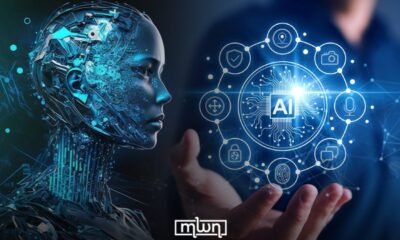AI Insights
Is Artificial Intelligence in danger? 95% projects fail; MIT report makes shocking revelation, it says…
It is believed that with the advent of this technology, companies and businesses will generate more revenue.

New Delhi: Artificial Intelligence is in trend, and it will be used in almost every application soon, say the industry news. It is believed that with the advent of this technology, companies and businesses will generate more revenue. But, in reality, the pilot projects of most companies are stuck at the initial stage.
What does MIT’s latest report reveal?
Massachusetts Institute of Technology (MIT) has released a report titled ‘The GenAI Divide: State of AI in Business 2025’, in which shocking facts were put forward. The report shows that even though companies have placed a big bet on generative AI, no major change has been seen in increasing revenue.
According to the report, only 5% of the AI pilot programmes run by companies around the world have been successful. Even after the integration of powerful AI models, companies did not get the expected results, due to which this technology has not been able to prove fully effective now.
Why is the use of AI failing?
Many reasons are being given behind the failure of AI integration, including unrealistic expectations, poor integration and lack of proper adoption. Companies want rapid change, but are not investing enough in the training and research required for this.
In the last few years, it was said that AI tools like ChatGPT, Gemini and Cloud would completely change the workplace. But the report shows that at present, AI can handle only up to 30% of office tasks reliably. The rest of the work will depend on humans.
Partial benefit in content and service
AI has definitely proved beneficial for companies in areas like automated content creation, customer service chatbots and data analysis. But the dream of reducing costs and increasing productivity on a large scale has not been fulfilled yet.
According to media reports, MIT’s study found that the biggest problem in adopting AI at the enterprise level is the learning gap. Companies implemented AI tools rapidly, but did not invest in customising them according to their needs, due to which the results were weak.
Real possibilities of AI in the future
Experts believe that the real benefit of AI will be found only when companies adapt these tools according to their business model. In the coming times, the way of adopting AI will change, and only then will this technology prove to be a real game changer in reducing costs and increasing productivity.
HIGHLIGHTS
- Artificial Intelligence is in trend, and it will be used in almost every application soon, say the industry news.
- MIT has released a report titled ‘The GenAI Divide: State of AI in Business 2025’, in which shocking facts were put forward.
- The report shows that even though companies have placed a big bet on generative AI, no major change has been seen in increasing revenue.
- According to the report, only 5% of the AI pilot programmes run by companies around the world have been successful.
Many reasons are being given behind the failure of AI integration, including unrealistic expectations, poor integration and lack of proper adoption. Companies want rapid change, but are not investing enough in the training and research required for this.
AI Insights
How Artificial Intelligence is Redefining Business Process Automation

In today’s fast-paced economy, businesses are under constant pressure to operate more efficiently while reducing costs and improving customer experiences. Automation has long been a solution, but traditional methods such as simple scripts or rigid workflows often fall short in terms of adaptability and intelligence. This is where artificial intelligence comes into play. By partnering with an Artificial Intelligence Development Company, organizations can unlock new opportunities for smarter decision-making, streamlined operations, and scalable growth.
The growing interest in AI-driven automation reflects its role as a key enabler of digital transformation. Unlike conventional automation, AI systems can analyze large datasets, learn from patterns, and make predictions that allow businesses to stay competitive in increasingly dynamic markets.
Why AI for Business Process Automation
Traditional automation methods—such as scripts or Robotic Process Automation (RPA)—are useful for handling repetitive, rule-based tasks. However, they lack flexibility and cannot adapt to new or changing conditions without manual intervention. Artificial intelligence takes automation a step further by enabling systems to learn, adapt, and improve over time.
Through machine learning and advanced data analytics, AI can identify hidden patterns, make predictions, and support real-time decision-making. This makes it possible not only to automate processes but also to optimize them dynamically, driving more value than traditional approaches.
Key Areas of Application
Finance
AI enables faster and more secure payment processing, advanced transaction analysis, and fraud detection systems that continuously learn to recognize suspicious patterns.
Marketing and Sales
From demand forecasting and personalized customer experiences to intelligent chatbots, AI helps companies better understand their audience and increase conversion rates.
Manufacturing and Logistics
AI-powered tools streamline supply chain management, predict equipment maintenance needs, and reduce downtime, ensuring smoother operations and higher efficiency.
Human Resources (HR)
Recruitment processes are enhanced through automated resume screening, predictive analysis of employee retention, and data-driven insights for workforce planning.
Advantages of Implementation
The implementation of AI in business processes brings several clear advantages. One of the most significant is cost reduction: by automating repetitive, labor-intensive tasks, companies can cut manual rework and optimize resource allocation, which lowers operating expenses without sacrificing quality. AI also accelerates processes, as models are capable of handling large data streams in near real time.
This speed translates into faster approvals, more efficient routing, more accurate forecasting, and quicker customer responses, all of which shorten cycle times. Another key benefit is error minimization. With advanced pattern recognition and anomaly detection, AI reduces human error, ensures data consistency, and helps stabilize performance metrics across workflows.
Finally, AI offers unmatched flexibility and scalability. Systems continuously learn from new data, allowing them to adapt to changing rules and business volumes, while cloud-native deployments make it possible to scale operations seamlessly as demand increases.
Potential Challenges
Despite these benefits, businesses face certain challenges when adopting AI automation. Costs and timelines are among the first hurdles. The discovery phase, data preparation, model training, and integration require significant upfront investment, and success often depends on a phased delivery approach to manage risk.
Data quality is another critical factor. If the available data is incomplete, biased, or siloed, the outcomes will inevitably suffer. Strong governance, robust cleaning pipelines, and continuous monitoring are necessary to maintain reliable results. Ethical and legal considerations must also be addressed.
Organizations need to ensure that their AI solutions operate with transparency, fairness, and respect for privacy, while remaining fully compliant with regulatory standards and internal policies.
Conclusion
AI-driven automation is now a core lever of competitiveness, improving speed, accuracy, and margins while enabling adaptive operations. Start small, pick a high-impact process, validate with a pilot, then scale iteratively with robust data governance and clear ROI checkpoints.
Do You Want to Know More?
AI Insights
Local Events | coastsidenews.com

We recognize you are attempting to access this website from a country belonging to the European Economic Area (EEA) including the EU which
enforces the General Data Protection Regulation (GDPR) and therefore access cannot be granted at this time.
For any issues, contact customerservice@coastsidenews.com or call (650) 726-4424.
AI Insights
AI to Disrupt Stocks, Force Investors to adopt Bitcoin — Analyst

Bitcoin (BTC) will be a better investment than stocks in the coming decades due to artificial intelligence speeding up innovation cycles, making public companies inefficient investment vehicles, analyst and investor Jordi Visser predicted.
“If the innovation cycle is now sped up to weeks, we are in a video game where your company never hits escape velocity, and in that world, how do you invest? You don’t invest, you trade,” Visser told Anthony Pompliano on Saturday. He also said:
“Bitcoin is a belief. Beliefs last longer than ideas. There are no companies in the S&P 500 from 100 BC; gold has been around since then. Bitcoin will be around for a long, long time. It’s a belief at this point, and people can fight it, but it’s going to be around.
I think you want to start shorting ideas, and you want to be long beliefs,” Visser continued, adding that AI may compress what normally would have taken 100 years to accomplish in only five years.
The prediction sheds light on the potential future of finance and capital structures, as artificial intelligence and blockchain technology disrupt the legacy financial system, driving more value and participants to the digital economy.
Related: Bitcoin faces a fee crisis that threatens network security: Can BTCfi help?
Eric Trump predicts $1M BTC as public companies adopt crypto
Companies continue buying crypto and Bitcoin directly as treasury reserve assets, often rebranding as pure crypto treasury plays and dumping their legacy business models.
These legacy financial vehicles provide equity investors with indirect exposure to BTC and crypto, while siphoning funds from traditional capital markets to digital finance.
Eric Trump predicted Bitcoin would hit $1 million per coin, telling the audience at the Bitcoin Asia 2025 conference in Hong Kong that nation-states, wealthy families, and public companies are all buying BTC.
Bitcoin’s market capitalization is over $2.1 trillion at the time of this writing, with some analysts predicting that it will overtake gold’s market cap over the coming decades.
The digital asset’s cross-border nature and ability to earn yield through deployment in decentralized finance (DeFi) applications give it a competitive advantage over gold as a store of value, some crypto industry executives have argued.
Magazine: Danger signs for Bitcoin as retail abandons it to institutions: Sky Wee
-
Tools & Platforms3 weeks ago
Building Trust in Military AI Starts with Opening the Black Box – War on the Rocks
-

 Business2 days ago
Business2 days agoThe Guardian view on Trump and the Fed: independence is no substitute for accountability | Editorial
-

 Ethics & Policy1 month ago
Ethics & Policy1 month agoSDAIA Supports Saudi Arabia’s Leadership in Shaping Global AI Ethics, Policy, and Research – وكالة الأنباء السعودية
-

 Events & Conferences3 months ago
Events & Conferences3 months agoJourney to 1000 models: Scaling Instagram’s recommendation system
-

 Jobs & Careers2 months ago
Jobs & Careers2 months agoMumbai-based Perplexity Alternative Has 60k+ Users Without Funding
-

 Funding & Business2 months ago
Funding & Business2 months agoKayak and Expedia race to build AI travel agents that turn social posts into itineraries
-

 Education2 months ago
Education2 months agoVEX Robotics launches AI-powered classroom robotics system
-

 Podcasts & Talks2 months ago
Podcasts & Talks2 months agoHappy 4th of July! 🎆 Made with Veo 3 in Gemini
-

 Podcasts & Talks2 months ago
Podcasts & Talks2 months agoOpenAI 🤝 @teamganassi
-

 Mergers & Acquisitions2 months ago
Mergers & Acquisitions2 months agoDonald Trump suggests US government review subsidies to Elon Musk’s companies





















